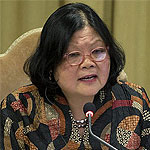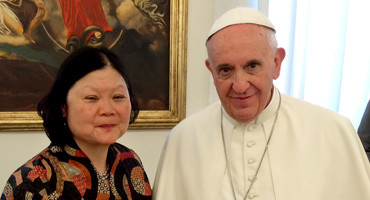



Laudato Si’ calls for an ecological conversion of everyone
Salt + Light Media
Tuesday, September 1, 2015

 Dr. Carolyn Woo, the CEO and President of Catholic Relief Services (CRS), was one of five presenters invited by the Vatican to speak at the June 18, 2015 press conference launching Laudato Si, Pope Francis’ encyclical on the environment. Drawing on her 14 years as dean of the Mendoza School of Business at the University of Notre Dame before coming to CRS in 2012, Woo spoke on the role of business in the issues raised by the encyclical. Here is a summary of Dr. Woo’s remarks:
Dr. Carolyn Woo, the CEO and President of Catholic Relief Services (CRS), was one of five presenters invited by the Vatican to speak at the June 18, 2015 press conference launching Laudato Si, Pope Francis’ encyclical on the environment. Drawing on her 14 years as dean of the Mendoza School of Business at the University of Notre Dame before coming to CRS in 2012, Woo spoke on the role of business in the issues raised by the encyclical. Here is a summary of Dr. Woo’s remarks:The fundamental question posed by the Pope is, “What kind of world do we want to leave those who come after us, to the children who are now growing up”? I am a mother and someday I look forward to being a grandmother, and I think that question is completely relevant to each of us and, of course, to business.The Pope calls for an ecological conversion that today begins with consciousness, which must lead us to conscience and from there to conviction and then to conduct, to what and how we will change. Pope Francis says, “What is the purpose of our life in this world? Why are we here? What is the goal of our work and all our efforts?" These are fundamental questions that businesses ask when they put together their mission statement. The Pope says that any answer must include a contribution to our common home.While this encyclical points out major challenges and heartbreaking evidence of devastation and destruction from our collective action, I see it as a very hopeful document because it shows we have the potential to reverse the course and that business has the potential to do the right thing. It invites business to be part of the solution. It reminds us that business can be a noble vocation. A lot of people think of business as a necessary evil. This is an invitation to business to be a necessary good. The choice is up to us.The Pope very clearly states that we have done great damage to our common home. He reminds us of the concept of “global commons,” the tangible and intangible assets that belong to all humankind -- our water, our atmosphere, our forest, our fisheries, our genetic materials, even our biodiversity. Species are not just exploitable resources for humans, they have inherent value in and of themselves. Each creature has its own purpose with a value that is not dependent on what men put on it. We have to have a different way of governing the global commons.I find the encyclical to be extremely poetic, spiritually inspiring, but also very, very pragmatic. The Pope asks us not to rely just on market forces, or on technology. Both have their benefits, but they will not get us to where we need to be. They must be guided by moral energies and human values, with a commitment to serve all – not just some -- people, to serve us as human beings and not just as consumers. The Pope also reminds us that the noblest calling of business -- a “sacred trust” he calls it -- is to create jobs. The right to work is fundamental, allowing people not just to achieve their dignity, but also to participate in co-creation with God. It gives us meaning, it gives us purpose. An over-reliance on markets and technology must not blind us to the fact that job creation is a fundamental role of business.The Pope warns us about is the dangers of short-term thinking which is self-defeating. If we stop investing in people in order to gain short-term financial gain, it is bad business for society and, if the Pope allows me to add one line, I would say it is actually bad business for business also. Particularly problematic, and we saw this illustrated in the recent financial crisis, is when the financial sector achieves -- at all costs -- its own financial gains while creating havoc for everybody else, including other businesses.
The encyclical makes clear that business must account for all costs involved in production, not just the financial cost which is a fraction of the total cost. There is a business concept called “externalities” -- benefits and costs that accrue to a business as well as other people and other sectors of society. We all need to adopt a movement that has emerged in business over the last 20 years of the triple bottom line – the planet and people in addition to profits. The Pope makes clear the urgency of all adopting this accounting.The encyclical also raises the importance of sustainable development in which economic growth is not the only metric of success. Unlimited growth at the cellular level causes cancer. Unlimited growth in economy and society will cause us to run into planetary boundaries, not only climate change, but also issues such as ocean acidification, de-forestation, chemical pollution, ozone depletion, land use constraints, depletion of water resources and such. We need to rethink the priority we give to unlimited growth, realizing that it eventually might lead not to growth but to unsustainable damage and harm.The Pope is actually a forward-thinking business leader, understanding that investing in sustainability is a “win-win” opportunity for business, avoiding the costs that comes with catastrophic failures like coastal disasters and droughts. Such leaders recognize the benefits of reducing the use of resources and materials. So the Pope is absolutely right to remind us that investing in sustainability is not only a moral imperative, it is a prudent economic decision.The encyclical makes clear that economic development must be inclusive, that everyone should gain from it, not just some people, and particularly not at a cost to others.There are so many people who hear and agree with the Pope’s message. Businesses should recognize the opportunity as these customers strive to become virtuous consumers. At every step of design and production, businesses can recycle and reuse, they can use sustainable energy sources, they can treat people and communities in the supply chain with dignity and respect. Such actions can resonate in the marketplace.
None of this will be possible unless government, business and the public work together. Talk is not enough, just saying all these good things for the sake of marketing and branding. In the end, businesses’ authenticity and depth of our commitment is what will really make a difference. Remember, business is not just an economic undertaking, it is a human enterprise. Because it is a human enterprise, business must be by the people and for the people. If it is just business as usual, none of us will be around to enjoy any benefits.
Related Articles:
<<
SUPPORT LABEL
$50
$100
$150
$250
OTHER AMOUNT
DONATE
Receive our newsletters
Stay Connected
Receive our newsletters

Stay Connected








